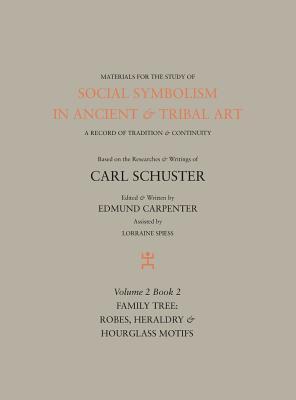6. Vol. 2, Book 2 - Family Tree: Robes, Heraldry & Hourglass Motifs
In Family Tree: Robes, Heraldry & Hourglass Motifs, Carpenter argues that the earliest manifestations of visual art are to be found on the human body, as skin decorations and on worn garments. He looks to surviving examples of decorated pelts, robes and bags, to explore their motifs of genealogical patterns. By looking at examples surviving into modern times, Carpenter argues that paleolithic prototypes may be reconstructed. He also establishes a distinction between the art of men and women in hunter-gatherer societies, stating that the sophisticated patterning exhibiting lineage was usually passed down by women in ephemeral materials such as garments, whereas men's work survives in carved stone and bone, albeit in less sophisticated and fragmentary copies of the women's traditions. Specific motifs are discussed, such as heraldic symbols and hourglass shapes.
